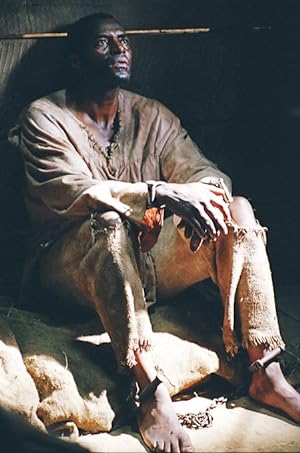Charles Burnett directed Nat Turner: A Troublesome Property, a documentary that aired on PBS and was featured at various film festivals. The documentary is only fifty-seven minutes. It tackles one of my favorite cultural historical problems. How can you determine the facts about and surrounding a historical figure and separate them from the lens through which people see that figure and interpret him through their perspective based on race, gender and era? The answer is that you can’t.
In chronological order, Nat Turner: A Troublesome Property goes through the various interpretations of the titular historical figure. Different actors depict Turner depending on the version that the film is focusing on at that particular moment. Carl Lumbly is the most famous actor and portrays Thomas R. Gray’s version.
Gray was Turner’s attorney who allegedly recorded Turner’s words in The Confessions of Nat Turner, which is probably the best-known version. William Wells Brown, an escaped slave and abolitionist, used this account as a jumping off point for his mediation on Turner in The Black Man: His Antecedents, His Genius and His Achievement. Harriet Beecher Stowe, who is best known for her internationally best-selling novel, Uncle Tom’s Cabin, used the historical figure and the Supreme Court’s Dred Scott decision as inspiration for her next novel, Dred: The Tale of the Great Dismal Swamp. Randolph Edmonds wrote Nat Turner: A Play. William Styron wrote a controversial novel, The Confessions of Nat Turner, which sparked so much outrage that the following year, an anthology of criticism was published and called William Styron’s Nat Turner: Ten Black Writers Respond, which included Gray’s account. If the Internet existed in the sixties, the think pieces would have come out immediately, and Styron’s book may have been pulled from circulation instead of becoming a best seller. The hilarious part is that now most people know about Sophie’s Choice, but not necessarily the author associated with it or his other works. The first one endures because it is the closest to Turner and alleges to be more autobiographical. In the interest of full disclosure, it is the only one of the aforementioned works that I have read.
Unlike my plodding summary, Nat Turner: A Troublesome Property goes through these developments so seamlessly and rapidly that you may not consciously realize that Burnett’s film took you through over a century of written work about one man, discussed how each era influenced the work and its perspective of the man, and how we look at that work today. What it lacks in production value, the documentary more than makes up for in substance though if you do not like talking heads documentaries, no amount of substance will keep you engrossed in this film. I’m only sorry that Burnett’s documentary wasn’t made more recently because in a world in which a black minor holding a bag of Skittles deserves death and kneeling is met with derision, I would love to hear how people interpret a black man leading a rebellion and killing people. Some people are still claiming that slavery was not that bad or try to call it (involuntary) immigration so a person like Turner would make their head explode.
The most interesting aspect of Turner is how he viewed the 52% if you simply look at his actions. He killed women and children, which is the most controversial part of his legacy because they are correctly considered as literally defenseless, but they are still complicit as property owners. If you look at a couple of modern day survivors of slavery, Jaycee Dugard and Elizabeth Smart, women were complicit in their captivity, but the only children involved were the victims themselves. Neither Dugard nor Smart could physically resist their captors, but if they could, would we be horrified if they physically attacked the women who helped kidnap them then benefitted from their uncompensated labor, including rape, involuntary sex work? Do we view the black women and children who were victims like Dugard and Smart with no hope of rescue in the antebellum South as similarly defenseless as the women and children killed by Turner and his fellow rebels? Would we do anything to stop their suffering or shrug and talk about civility and legality?
The definition of self-defense depends on the definition of self. Since black people were legally not considered human beings, then self-defense is not an option, but neither should there be such a thing as a conviction for rebellion and making insurrection. When a chair breaks and hurts the sitter, is the chair guilty? Isn’t slavery of living beings an interesting paradox. They are not considered sentient beings so they can be exploited, but when they do something wrong, they suddenly become capable of thought and action. How sway? Thankfully we have made so much progress since 1832 that if a black child is followed by a man, he should not view that man as a kidnapper and allegedly defend himself against his aggressor or else he will deserve death without even the benefit of a trial as was given to a person that was legally no more a person than a desk or a pen. Free at last! When was lynching made into a federal crime?
Nat Turner: A Troublesome Property is a must see documentary, but because it lacks the cinematic narrative flair of I Am Not Your Negro, even with the multiple recreations, and relies on academics to tell its story, it may wash over some viewers as if they were in a Carl Schultz cartoon, and the teacher kept saying, “Wah wah wah.” I loved it.
Stay In The Know
Join my mailing list to get updates about recent reviews, upcoming speaking engagements, and film news.





